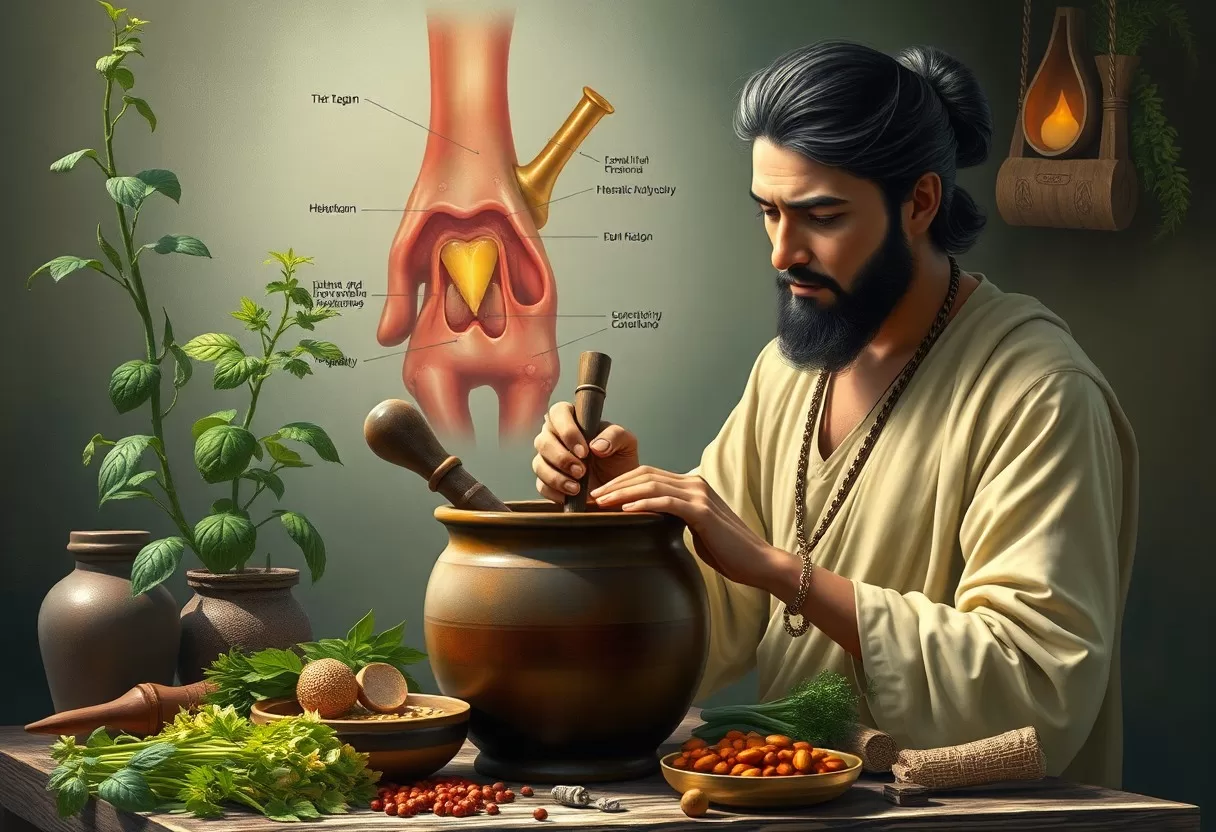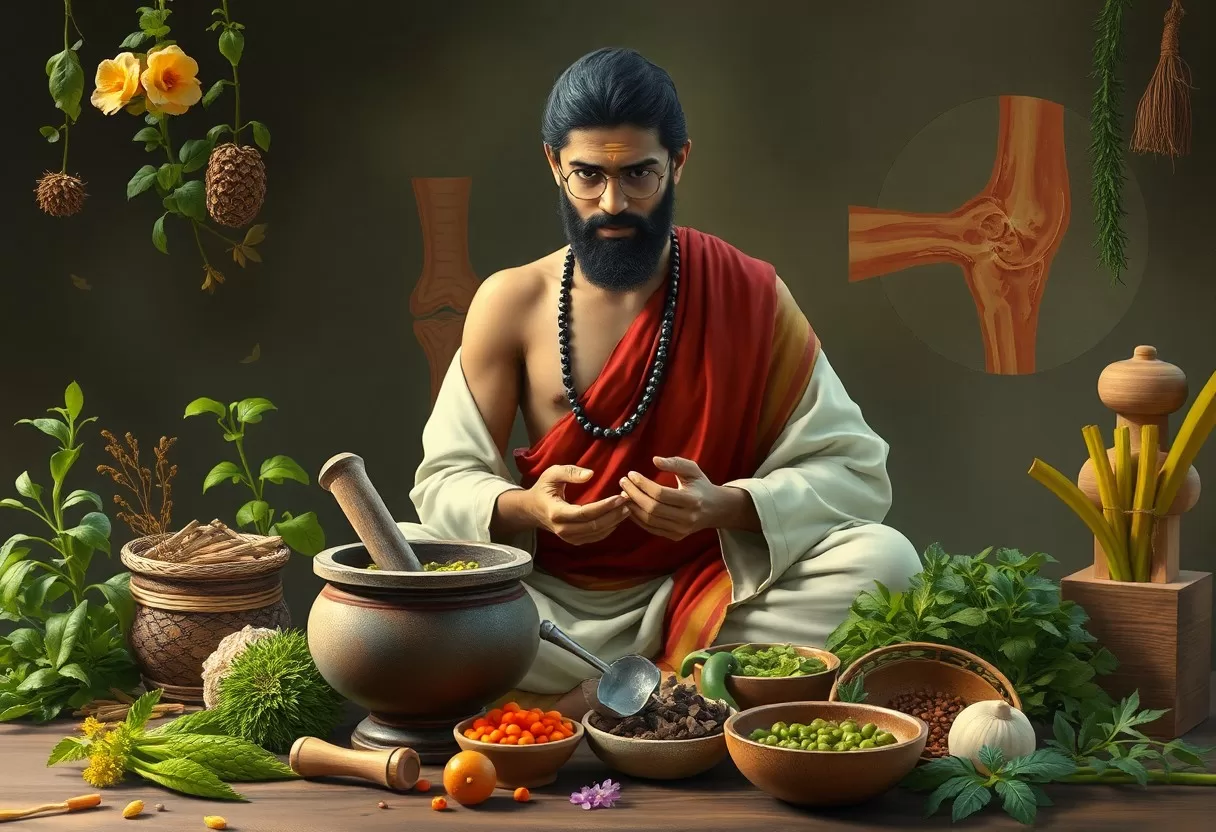Many individuals seeking relief from arthritis symptoms turn to Ayurvedic medicine for a holistic approach. This ancient system emphasizes the balance of your body, mind, and spirit while offering natural treatments that can significantly reduce inflammation and joint pain. You can explore a range of remedies, including herbal supplements, dietary changes, and lifestyle modifications, all designed to improve your overall well-being. By integrating these methods into your daily routine, you may find a positive shift in your health and quality of life, allowing you to manage your arthritis more effectively.
Key Takeaways:
- Natural Ingredients: Ayurvedic remedies often utilize herbs like turmeric and ginger, which are known for their anti-inflammatory properties.
- Dietary Adjustments: A balanced diet, incorporating whole grains and fresh fruits and vegetables, can help in managing arthritis symptoms.
- Holistic Approach: Ayurveda emphasizes mind-body balance, including stress reduction techniques like yoga and meditation to improve overall well-being.
Understanding Arthritis
To grasp the impact of arthritis on your life, it’s important to know that it is a common inflammatory condition affecting the joints and surrounding tissues. Pain, swelling, and stiffness are characteristic symptoms that can affect your mobility and overall quality of life. Understanding the different forms of arthritis is vital in seeking effective relief.
Types of Arthritis
To help you identify the variations, here’s a breakdown of the most common types:
| Osteoarthritis | Wear and tear of joint cartilage. |
| Rheumatoid Arthritis | Autoimmune disorder affecting joints symmetrically. |
| Psoriatic Arthritis | Joint inflammation linked with psoriasis. |
| Gout | Crisis stemming from uric acid buildup. |
| Juvenile Arthritis | Arthritis in children under 16. |
Thou can explore these types further to understand their unique characteristics and avoid unnecessary discomfort.
Symptoms and Diagnosis
Between the various forms of arthritis, the symptoms can vary, but several common indicators deserve your attention. If you experience persistent pain, swelling, stiffness, or decreased range of motion in your joints, these might signal arthritis.
Arthritis typically presents a range of symptoms that can affect you significantly. You might notice persistent joint pain, swelling, and stiffness, particularly during morning hours. Fatigue and low-grade fever may also accompany the condition in some cases, especially in autoimmune varieties like rheumatoid arthritis. Seeking early diagnosis through your healthcare provider is important, as timely intervention can prevent further joint damage and substantially improve your quality of life.
Principles of Ayurveda
You may find that Ayurveda is not just a medicinal practice but a holistic approach that emphasizes the balance between body, mind, and spirit. Through natural therapies and a deep understanding of individual constitution, Ayurveda aims to restore harmony and promote overall well-being. By considering diverse aspects such as diet, lifestyle, and emotional health, you can achieve a state of equilibrium that contributes positively to your health.
Dosha Theory
Ayurveda is fundamentally based on the concept of doshas, which are the three life energies—Vata, Pitta, and Kapha—believed to govern all physiological processes in your body. Each person has a unique combination of these doshas, and understanding your predominant dosha can help tailor dietary choices and lifestyle practices to maintain your health.
Importance of Balance
Ayurveda emphasizes achieving a state of balance among the doshas, which is vital for your health. When one dosha becomes imbalanced, it can lead to various health issues, including arthritis. Recognizing the signs of imbalance in your body allows you to take proactive steps in your self-care routine.
Indeed, maintaining balance is necessary for your overall health and well-being. When doshas are in harmony, you experience enhanced vitality and reduced discomfort. An imbalance can manifest in your body as inflammation and pain, particularly in conditions like arthritis. By focusing on lifestyle choices, including balanced nutrition and stress management, you can prevent these imbalances and promote effective healing. It is crucial for you to pay attention to your body’s signals and seek to achieve this equilibrium to support your longevity and health.
Ayurvedic Remedies for Arthritis
Despite being a chronic condition, arthritis can be managed effectively with Ayurvedic remedies that focus on balancing your body and promoting overall well-being. Ayurvedic treatments emphasize natural herbs, dietary adjustments, and lifestyle changes specifically tailored to your needs, helping to alleviate symptoms and improve joint health.
Herbs and Their Benefits
By incorporating various Ayurvedic herbs into your daily routine, you can harness their potent anti-inflammatory and analgesic properties. Herbs such as turmeric, known for its active compound curcumin, can significantly reduce pain and inflammation, while ginger helps improve circulation and overall joint mobility.
Dietary Recommendations
For optimal health and effective management of arthritis, following specific dietary adjustments can make a significant difference. Focus on incorporating anti-inflammatory foods, such as leafy greens, nuts, and fatty fish, while reducing processed foods and sugars that may exacerbate your symptoms.
Recommendations for your arthritis-friendly diet include consuming more omega-3 fatty acids found in fish like salmon, flaxseeds, and walnuts. It’s also beneficial to increase your intake of antioxidant-rich fruits such as berries, which can help combat oxidative stress. Additionally, consider incorporating spices like turmeric and garlic into your meals for their anti-inflammatory effects. Staying hydrated and consuming a balanced diet can significantly contribute to managing your arthritis symptoms effectively.

Lifestyle Modifications
After integrating Ayurvedic remedies into your routine, consider making lifestyle modifications that enhance your overall well-being. This includes following a balanced diet that supports your joints and limits inflammatory foods. Additionally, you can explore Ayurvedic treatment for rheumatoid arthritis: Does it work? to learn how holistic approaches can complement your lifestyle changes and improve your symptoms.
Exercise and Physical Therapies
With a focus on gentle movements, exercise plays a vital role in managing arthritis. Incorporate low-impact activities like walking, swimming, or yoga into your daily routine to maintain joint flexibility and strength. Regular physical therapy can further enhance your recovery and help prevent stiffness.
Stress Management Techniques
Techniques for managing stress are important for your overall health, especially if you have arthritis. Implement daily practices like meditation, deep breathing, or yoga to help reduce tension. Alongside these, nurturing your social connections and engaging in enjoyable activities can foster a positive mindset, which may alleviate symptoms.
Exercise can also be a form of stress relief. Engaging in physical activity releases endorphins, which help improve your mood. Regular practice of these stress management techniques can lead to a more balanced emotional health, positively influencing your arthritis symptoms. Incorporating these methods into your daily routines enables you to manage stress effectively, contributing to your overall well-being.
Ayurvedic Therapies
Many Ayurvedic therapies focus on detoxification and balancing your body’s energies, which can significantly alleviate arthritis symptoms. These therapies, deeply rooted in ancient practices, often include personalized treatments that blend herbal remedies, dietary modifications, and lifestyle adjustments tailored specifically for you. By restoring harmony within your body, Ayurveda aims to reduce inflammation and enhance joint mobility, allowing you to lead a more active life.
Panchakarma
On your journey toward relief, Panchakarma offers a comprehensive detoxification process designed to purify your body. This therapeutic regimen includes five key treatments: Vamana (vomiting therapy), Virechana (laxative therapy), Basti (enema therapy), Nasya (nasal therapy), and Raktamokshana (bloodletting). Each of these treatments works in harmony to remove toxins and restore balance, making it an effective option for managing arthritis discomfort.
Nasya and Basti Treatments
Beside Panchakarma, Nasya and Basti treatments serve as specialized therapies targeting arthritis. Nasya involves the application of herbal oils or powders through the nasal passages, effectively treating upper respiratory issues and enhancing neurological function. Basti, an enema therapy, targets lower digestive health by administering medicated oils or herbal preparations to cleanse and rejuvenate your system. Both of these treatments aim to nourish and fortify your body, offering significant therapeutic benefits.
Panchakarma, including Nasya and Basti, plays an integral role in managing arthritis symptoms. These therapies can offer profound relief by eliminating toxins and enhancing your body’s natural healing processes. However, it is vital to consult a qualified Ayurvedic practitioner before starting these treatments, as they can guide you through personalized sessions that address your unique health needs and ensure your safety throughout the process.
Integrating Ayurveda with Conventional Treatment
Keep in mind that integrating Ayurveda with conventional treatment can enhance your overall well-being. This holistic approach combines ancient wisdom and modern medical practices, allowing you to experience the benefits of both systems. By exploring dietary changes, herbal remedies, and lifestyle adjustments alongside your conventional treatments, you can support your body’s healing process and improve your quality of life.
Collaborative Approaches
About developing a collaborative approach means working with both Ayurvedic practitioners and conventional healthcare providers. This partnership allows you to create a comprehensive treatment plan that addresses not only your physical symptoms but also the emotional and spiritual aspects of your arthritis. By balancing these approaches, you can potentially achieve better outcomes and improve your overall health.
Consultations with Healthcare Providers
Any time you consider incorporating Ayurvedic remedies into your arthritis treatment, it’s wise to consult with your healthcare providers. This ensures that all aspects of your health are taken into account, especially if you’re using medication. Open communication between you, your healthcare team, and Ayurvedic practitioners can lead to a more personalized and effective treatment strategy.
Ayurveda emphasizes the importance of discussing your health concerns with healthcare providers before making any significant changes to your treatment plan. Engaging in open dialogue about your Ayurvedic practices ensures that your doctors can monitor your response and adjust your medications as needed. Furthermore, it helps identify any potential interactions between herbal remedies and medicines. Your proactive involvement in this collaborative process can lead to a more comprehensive approach to managing arthritis.
Summing up
So, as you explore Ayurvedic remedies for arthritis, you’ll find a holistic approach that focuses on balancing your body and mind. Utilizing herbs, dietary adjustments, and lifestyle changes can significantly enhance your joint health and reduce inflammation. Incorporating practices such as yoga and meditation can further support your journey towards relief. By embracing these natural solutions, you can empower yourself to manage your arthritis symptoms effectively, paving the way for a more comfortable and active life.
Q: What are some common Ayurvedic remedies for arthritis?
A: Ayurvedic remedies for arthritis often focus on balancing the body’s energies (doshas) and reducing inflammation. Some popular remedies include:
- Turmeric: Contains curcumin, which has anti-inflammatory properties. It can be consumed in the form of turmeric milk or supplements.
- Ginger: Known for its anti-inflammatory effects, ginger can be added to meals or taken as ginger tea or capsules.
- Ashwagandha: This adaptogenic herb may help in reducing stress and inflammation, aiding in pain management.
- Mahanarayan oil: A traditional oil used for massage, which can help in improving circulation and reducing pain.
Q: How does Ayurveda approach the treatment of arthritis differently from conventional medicine?
A: Ayurveda takes a holistic approach to treating arthritis by focusing on balancing the mind, body, and spirit. Unlike conventional medicine which often targets symptoms with medication, Ayurveda emphasizes:
- Personalized treatment: Each individual’s dosha (body constitution) is assessed for tailored remedies.
- Lifestyle changes: Incorporating dietary adjustments, stress reduction techniques, and exercise plans suited to the person’s condition.
- Detoxification: Processes such as Panchakarma are used to cleanse the body of accumulated toxins that may cause joint pain.
Q: Are there specific dietary recommendations in Ayurveda for individuals with arthritis?
A: Yes, Ayurveda recommends a diet that supports joint health and reduces inflammation. This may include:
- Warm and cooked foods: Favoring warm meals over cold, as warm foods are said to be easier to digest and beneficial for joint health.
- Anti-inflammatory spices: Incorporating spices like turmeric, cumin, and black pepper into meals.
- Limit inflammatory foods: Reducing intake of processed foods, excess sugar, and nightshade vegetables, which may aggravate arthritis symptoms for some people.
- Hydration: Staying well-hydrated with warm herbal teas can also support joint lubrication.

